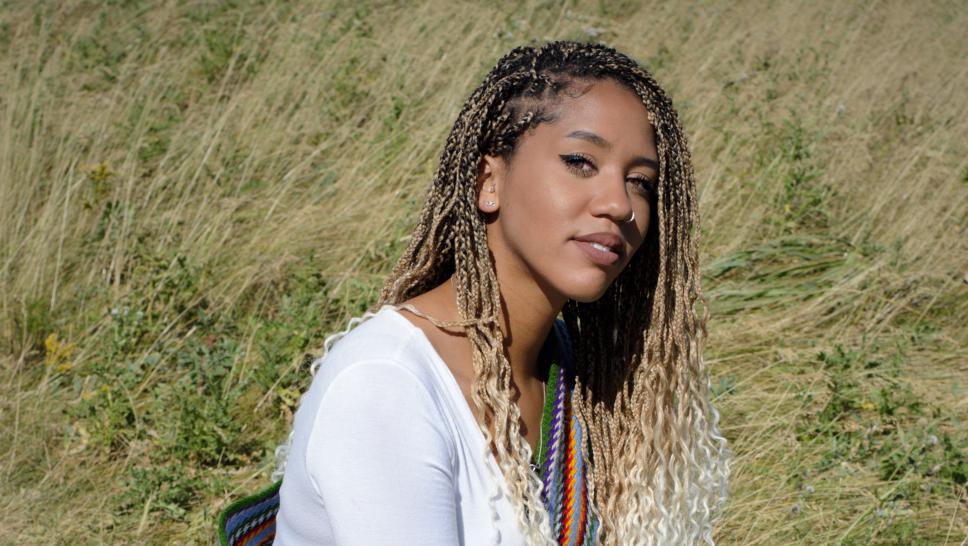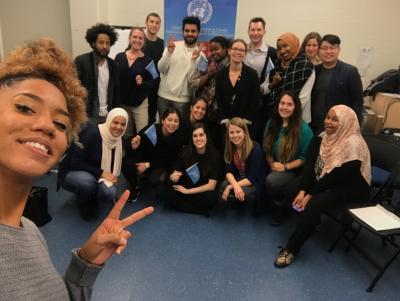
When Larissa Crawford spoke to the Humber College community in October, she explored the intersection of climate justice and racial justice and urged the audience to self-reflect.
She explained that racist harm can exist when one worldview and corresponding relationships are positioned as the universal truth, lacking acknowledgement that other worldviews and relationships exist and have value. Most of us, she says, aren't even aware of our own worldview.
She points towards Indigenous and settler worldviews and how they shape different relations to the land as an example.
"The relationship to the land is a threat to capitalism. We see this in our news cycles, our educational systems that refuse to acknowledge land-based learning as an essential part of curriculum. You see this everywhere. To not acknowledge this is to erase the harm this often causes."
Crawford is the founder and managing director of consulting firm Future Ancestors Services, a youth-led professional services social enterprise. She is of Metis and Jamaican ancestry and is a restorative circle keeper, published Indigenous and anti-racism researcher, award-winning ribbon skirt artist and mother to her five-year-old daughter, Zyra. She resides in Mohkintsis (Calgary) and delivered her talk virtually.
Crawford had the idea for Future Ancestors Services six years before it launched.
"I was very conscious of not starting something just to start something, and when I did incorporate an organization, it would be done ethically and in response to gaps in the sector I've seen or experienced myself," she said.
Crawford was working full-time, taking a full course load at school – with Zyra on her hip- and volunteering when the idea came into focus.
"I started working at a non-profit that received government grants. I had enough of the racism and ableism there after surviving the same harm in my previous government positions, and I saw it was impacting my ability to parent, a community member, and my physical health. It didn't translate into an impact I believed was worth it. And I quit," she said.
She put together a small team that started by reflecting on their experiences in the sector. Next, they reflected on how to make the work sustainable.

"Our work is deeply tied to our lived experience, and that's why we do it so well, but it requires us to really think about our healing and wellbeing too, as we navigate this work."
Future Ancestors Services works with nearly every federal ministry, and various educational institutions and corporate clients like law firms and publishing houses. They also commit to ensuring at least a third of their work is with grassroots, non-profit and Indigenous-led organizations. Crawford and her team of 10 have supported over 200 clients.
She leads by example and fosters a safe work environment where contractors feel a sense of belonging and support. One of the first questions she asks any prospective team member is about the harm or trauma they've experienced at past places of employment.
"We make sure we're doing everything in our power to not replicate the systems of harm we've experienced in past work spaces. We go through the organization and do a check and see if there is any threat of us doing that to them; if there is, we address that threat immediately," said Crawford.
Future Ancestors Services works with many post-secondary institutions – a sector Crawford knows intimately.
She studied there, but she also worked, having created various policy positions and contributing to initiatives seeking to foster anti-racist and Indigenized university environments.
"I went in multiple board rooms and asserted my lived experience as a young Afro-Indigenous student and mother. I said, 'These are my experiences as a student. There's not a specific policy addressing this. I've done the research and there's a mentor willing to work with me on this," she said.
The Future Ancestors Services team must often support institutions in overcoming the most basic but harmful myths of Canada's absence of racism- especially on campus.
At a staff and faculty level, she counsels organizations to alleviate the barriers students experience in accessing supports, especially regarding racism, disability, caregiving, mental and physical health.
"I had my daughter in my fourth year of university and witnessed very quickly the agency this teaching staff had in making my life very accessible or making it very, very inaccessible," she said.
Crawford has an aversion to the phrase "treat everyone the way you want to be treated," because everyone has different needs and cultural experiences. Instead, her advice to Humber College students is to leverage that lived experience in school and their careers and to do it in a sustainable way that feels right for them.
To learn more about Crawford and her team at Future Ancestors Services, visit: www.futureancestors.ca